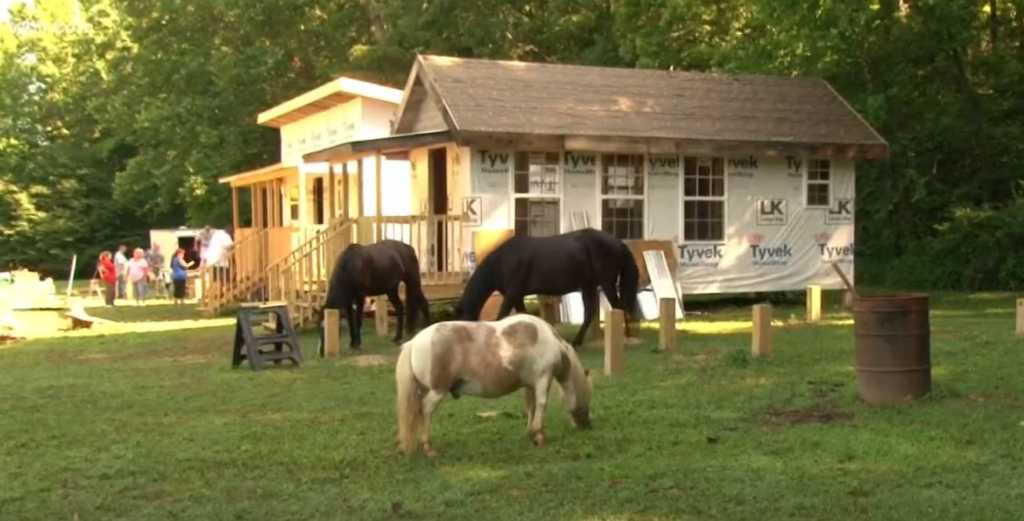A Kentucky Baptist church has thought up an extraordinary way to help its surrounding community battle opioid addiction. Crossroads Community Baptist Church in McCreary County recently launched an effort build 20 small homes to accommodate drug addicts and help them on the road to recovery.
Pastor Grant Hasty told WBIR-TV that some 32 percent of McCreary’s population lives below the poverty line, which has driven hundreds to self-medicate with opioids.
“When someone wants help and they don’t have a support system behind them on a regular basis to hold them accountable … that’s when they have issues of relapsing,” Hasty said.
The pastor explained that the church is in possession of 13 acres of land on a horse farm, half of which is being used for the housing project. Alongside providing the addicts with safe accommodation, the program also aims to include a job training course to help them become financially self-sufficient.
“There’s a hopelessness here,” said volunteer Vicki Kidd, adding that the immaculate new homes offer the addicts “a new beginning.”
Kidd was very clear about one thing, however: the program is not a “hand out.”
“[I]t’s a hand-up and that’s what we need to start doing in McCreary County,” Kidd said, adding that such a commitment to walking alongside those struggling with addiction “brings hope” in the community.
The opioid crisis has hit Kentucky hard. As a result, many businesses and churches are doing everything in their power to offer help and healing.
When Lexington restaurant owners Rob and Diane Perez found an empty ramekin in the trash at their eatery, they were confronted with the stark reality that one of their top servers was doing heroin. This was not new to the hardworking couple — they had already lost their first manager, who died in jail after trying to obtain prescription pills illegally.
Then, last year, they got a phone call saying that one of their chefs would not be coming into work because he had overdosed on heroin and died. It was a drug crisis of staggering proportions — that they had lost 13 employees to addiction over 10 years, with an astonishing half the cases being related to opioid drugs.
“They were not fired,” Mr. Perez said, as reported by The New York Post. “They were dead.”
But instead of shying away from the issue, they tackled it head-on.
More from the Post:
Last September, they opened DV8 Kitchen, a restaurant that not only hires people in treatment for addiction to opioids or other substances, but also focuses its entire business model on recovery, using the restaurant setting as a tool for rehabilitation.
The Perezes saw restaurants’ unusual potential for helping addicted people recover. “There’s customer service, culinary, baking, finances,” Mr. Perez said. “We can teach you any of these businesses from scratch.”
Cooking, in particular, he sees as “100 percent therapy.” In making bread, for example, “there is something magic about kneading the dough side by side with someone else, not making eye contact,” he said. “It is very tactile and freeing.”
It is clear that the crisis requires a multi-faceted approach in order to effectively combat escalating rates of addiction. With local businesses, government authorities and the church community working together, change can be realized.
In this spirit, the Kentucky Baptist Convention is also running a conference aimed specifically at those who are dealing with loved ones caught up in opioid addiction. Now, more than ever, the church must engage in this vital work.
“The consequences of the opioid crisis reaches into every community, affecting every family and church,” a webpage for the conference notes. “We all know someone who has suffered under this scourge and it demands a response. We must not remain silent. The opioid crisis is an epidemic that demands further engagement by the church.”
In February of this year, committed Christian and governor of Kentucky, Matt Bevin, launched a new resource aimed at helping those embroiled in opioid drug addiction: FindHelpNowKY.org.
According to Kentucky.gov, the website “allows users to search in real-time for a local substance use disorder (SUD) treatment center and will be promoted as part of the Governor’s ‘Don’t Let Them Die’ campaign, which seeks to bring awareness to the opioid crisis.”
“Kentucky is stepping up, ready to lead the nation as we address the opioid problem that plagues so many,” said Gov. Bevin, who has been known to organize prayer walks around tough neighborhoods. “We must all work together to solve this crisis.”



